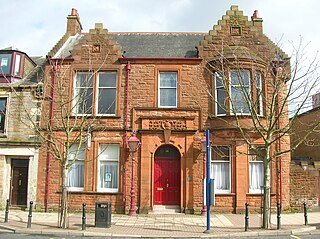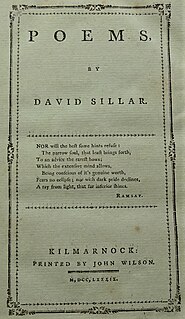Sillars is a surname. Notable people with the surname include:
James Sillars is a Scottish politician and campaigner for Scottish independence. Sillars served as a Labour Party MP for South Ayrshire from 1970 to 1976. He founded and led the pro-Scottish Home Rule Scottish Labour Party in 1976, continuing as MP for South Ayrshire until he lost the seat in 1979.
Johnson is a surname of English and Scottish origin. It is the second most common in the United States and 154th most common in the world. As a Scottish family name, Johnson is occasionally a variation of Johnston, a habitational name.
Souter is a Scottish surname derived from the Scots language term for a shoemaker, and may refer to:
Mulholland or Mullholland is a surname. Anglicized form of Gaelic Ó Maolchalann ‘descendant of Maolchalann’, a personal name meaning ‘chief of the calends’,
Paterson is a Scottish and Irish surname meaning "Fathers' son" or "son of Patrick". In Connacht, and Ulster, the name is considered to be an Anglicised form of the Irish language surname Ó Casáin. Paterson is rarely used as a given name. There are other spellings, including Patterson. Notable people with the surname include:
Gow is a Scottish surname. The name is derived from the Gaelic gobha, meaning 'smith'. The name is represented in Scottish Gaelic as Gobha.
McDuff is a surname. It is the Anglicized form of the Scottish Gaelic name Mac Dhuibh. Notable people with the surname include:
The surname Monaghan is a family name originating from the province of Connacht in Ireland. Mostly a last name.
The surnames MacGavin and McGavin are Scottish surnames, which are possibly variations of the surnames McGowan and MacGowan, which are Anglicised forms of the Scottish Gaelic MacGobhann and Irish Gaelic Mac Gabhann, meaning "son of the smith". When the surname MacGavin and McGavin originate from Glasgow and Moray, they can be represented in Scottish Gaelic as Mac a' Ghobhainn.
Mac a' Ghobhainn is a Scottish Gaelic surname, meaning "son of the smith". The surname is used as a Scottish Gaelic form of several English-language surnames: MacGowan, and McGowan; Smith; and in Glasgow and Moray, the surnames MacGavin and McGavin. The feminine form of Mac a' Ghobhainn is Nic a' Ghobhainn.
Ferrier is a surname of European origin.
Ó Cuindlis was the name of an Irish family of brehons and scholars from Uí Maine, located in present-day County Galway and County Roscommon, in Connacht. It means 'descendant of Cuindlis'. It was also spelt with Cuindilis and Cuindleas, later Cuinnlis and Coinlis, and in County Mayo Coinleisc and Coinlisc. The earliest form of the name can be traced back to an abbot from the 8th century, named Cuindles.

The Irvine Burns Club, based at the Wellwood Burns Centre & Museum, was founded on 2 June 1826 and is one of the world's longest continuously active Burns Clubs. At least five personal friends of Robert Burns were among the group of local gentleman, whose idea it was to form the club. Irvine in North Ayrshire is an old market town and port situated on the west coast of Scotland, approx 14 miles north of Ayr.
McFetridge is a surname, anglicized form of Scottish Gaelic Mac Pheadruis, patronymic from a Gaelic form of the given name Peter. Notable people with the surname include:
The surname "Lyall" is found early in Scotland and was derived from the Old Norse given name "Liulfr", where "ulfr" means Wolf. After the Viking settlement in Scotland name sounds would have changed. For example, "Liulfr" is pronounced 'lee-oolv-ur', but after time probably softened in pronunciation to 'lee-ooler' and then 'loo-il' and finally 'lyall' after the Old Norse "R" was dropped off the end. The Lyall Clan is a Sept of Clan Sinclair a Highland Scottish clan of Norman origin a people descended from Norse Vikings who held lands in the north of Scotland, the Orkney Islands, and the Lothians.
McAdam or MacAdam is a Scottish Gaelic clan which originated as a branch of Clan Gregor. As a surname it is most prominent in the Galloway and Ayrshire regions of Scotland. Some of their descendants are also to be found in Ireland, the United States, Australia and Canada.

David Sillar (1760–1830) was a Scottish farmer, poet, grocer, schoolteacher and baillie who was a close friend of the poet Robert Burns. He died in 1830, aged 70, after a long illness, and was buried in Irvine's Old Parish Church cemetery. His eroded gravestone was replaced by a facsimile thanks to the Irvine Burns Club. He married twice and had only one son survive him, a Dr. Zachary Sillar M.D. of Liverpool. His father was Patrick Sillar, tenant farmer at Spittalside near Tarbolton, Ayrshire. He first married a widow, Mrs Margaret Kerr, née Gemmell shortly after moving to Irvine and had seven children and his second wife was the sister of John Bryan of the Sun Inn, Kilmarnock.

Poems is a collection of poetry and songs by David Sillar, a close friend of the poet Robert Burns who had been encouraged to go into print by the success of Poems, Chiefly in the Scottish Dialect. Poems was printed by John Wilson of Kilmarnock in 1789. Sillar's interest in poetry predated his friendship with Burns, but was one of several reasons for it.
Alexander Tait, Sawney Tait or Saunders Tait was a tailor, a published poet and also a contemporary of Robert Burns who he knew well. Tait was also well acquainted with the published poet and close friend of Burns, David Sillar. Sawney spent much of his life in Tarbolton where he was an active member of the community. His poems were exhibited in the 1896 Burn Exhibition, a copy being loaned by the Mitchell Library. Alexander was generally known locally as 'Whip-the-cat' an old expression that referred to itinerant tailors, etc. who went from door to door to do work for others.
Grassick is a surname. Notable people with the surname include: